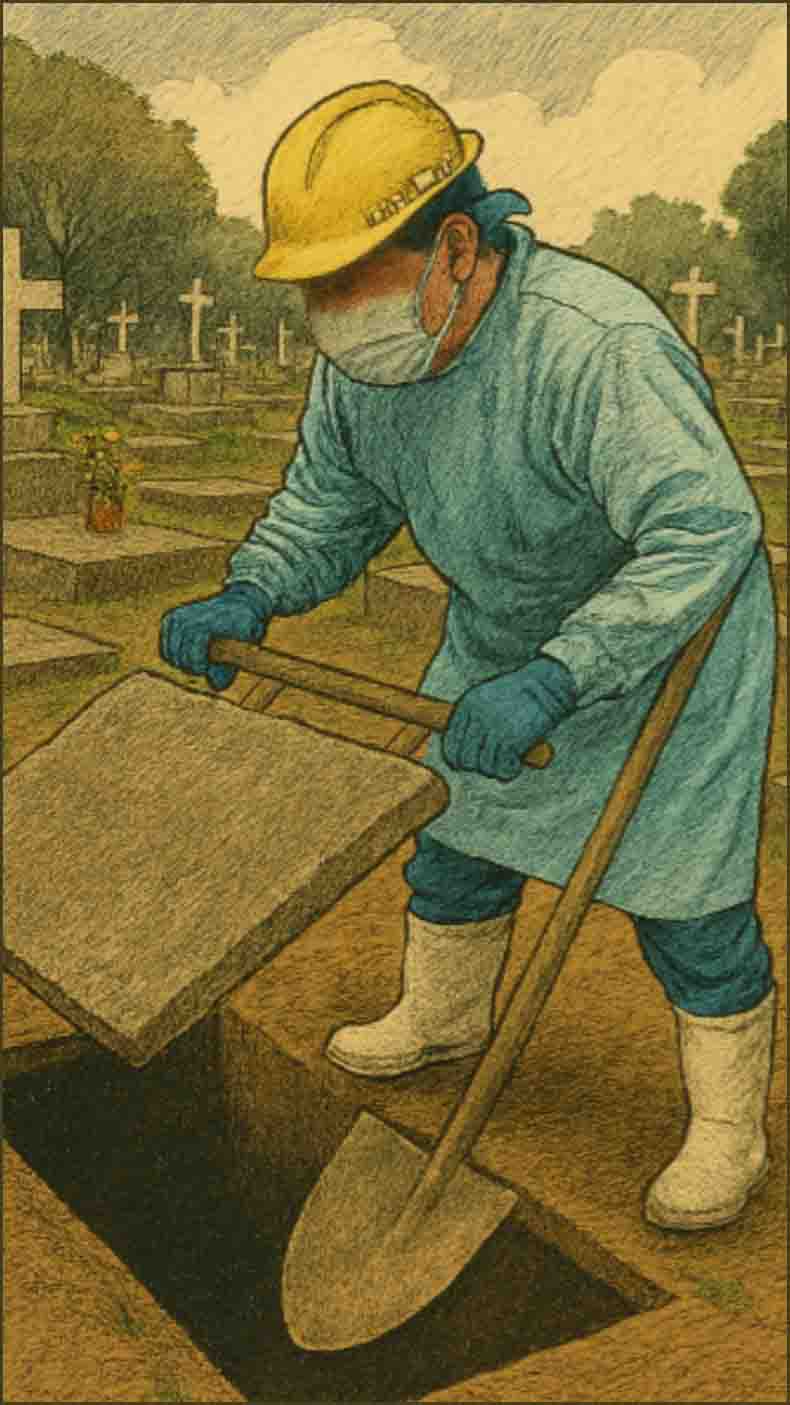Karina Penariol Sanches, Analyst in Science and Technology, Journalist at Fundacentro, São Paulo, SP, Brazil.
 With record numbers of deaths and burials, the COVID-19 pandemic worsened the already precarious working conditions in São Paulo’s municipal funeral service. Work overload led to the accumulation of tasks, deepened already exhausting and frustrating work experiences, and increased exposure to stress and social devaluation. This situation drove many workers to emotional exhaustion, resulting in weakened meaning of work, fatigue, and mental distress. These findings are discussed in the article The hard and precarious work of São Paulo municipal funeral workers during the COVID-19 pandemic (vol. 49, 2024), published in the thematic dossier Mental Health and Subjectivity; of the Brazilian Journal of Occupational Health/Revista Brasileira de Saúde Ocupacional (RBSO).
With record numbers of deaths and burials, the COVID-19 pandemic worsened the already precarious working conditions in São Paulo’s municipal funeral service. Work overload led to the accumulation of tasks, deepened already exhausting and frustrating work experiences, and increased exposure to stress and social devaluation. This situation drove many workers to emotional exhaustion, resulting in weakened meaning of work, fatigue, and mental distress. These findings are discussed in the article The hard and precarious work of São Paulo municipal funeral workers during the COVID-19 pandemic (vol. 49, 2024), published in the thematic dossier Mental Health and Subjectivity; of the Brazilian Journal of Occupational Health/Revista Brasileira de Saúde Ocupacional (RBSO).
To understand the activities carried out by these workers, their health impacts, and the political aspects involved in serving the population during this period, Carolina de Moura Grando (Union of Workers in Public Administration and Authorities of the Municipality of São Paulo), Luci Praun (Federal University of Acre), Renata Paparelli (Pontifical Catholic University of São Paulo), and Vera Lucia Salerno (State University of Campinas) interviewed16 workers. They were assigned to two cemeteries and one administrative hub, performing duties in burial services, wake ceremonies, security, driving, logistics, and funeral urns’ expedition.
The testimonies revealed that mental strain and suffering stemmed from several factors. One was the nature of care work directed toward grieving families, which became more distressing as contact with bereaved relatives had to be restricted.
Another was discrimination: a profession already stigmatized and socially invisible became even more so, as friends and relatives avoided contact out of fear of contagion. Isolation and the inability to share work experiences with family members contributed further to mental distress.
“If their work had already been considered ‘dirty,’ COVID-19 redefined that notion, associating their activity with supposed greater exposure to a little-known and potentially lethal disease,” observe the authors.
Devaluation was also a recurring theme in the interviews, with direct repercussions on the workers’ mental health. The intensification of work, combined with the mandatory removal of permanent workers over 60 years old and those with comorbidities, without replacement of civil servants to sustain the workforce, accelerated outsourcing. In this process, workers witnessed the loss of professional expertise accumulated over the years.
“Most research participants expressed that they were in a situation where they used their practical knowledge to train outsourced workers and ensure the continuity of activities, while simultaneously witnessing the end of their own professional role,” the authors emphasize.
Precariousness, low wages, and the erosion of work’s meaning created a sense of defeat and loss of purpose, making workers more vulnerable to exhaustion and illness.
“It is important to understand funeral services as a form of care work integrated into health attention and emergency planning in the city, requiring sufficient resources to ensure safe working conditions while considering the health impacts on these workers,” the study concludes.
To read the article, access
GRANDO, C.M., et al. The hard and precarious work of São Paulo municipal fune ral workers during the COVID-19 pandemic. Rev. Bras. Saúde Ocup. [online]. 2024, vol.49, edsmsubj3 [viewed 7 November 2025]. https://doi.org/10.1590/2317-6369/30422en2024v49edsmsubj3. Available from: https://www.scielo.br/j/rbso/a/sTRZDqCFrkhSzh5v3cMtrrS/
External links
Revista Brasileira de Saúde Ocupacional – RBSO
Revista Brasileira de Saúde Ocupacional (Fundacentro)
Revista Brasileira de Saúde Ocupacional – X
Como citar este post [ISO 690/2010]:



















Recent Comments